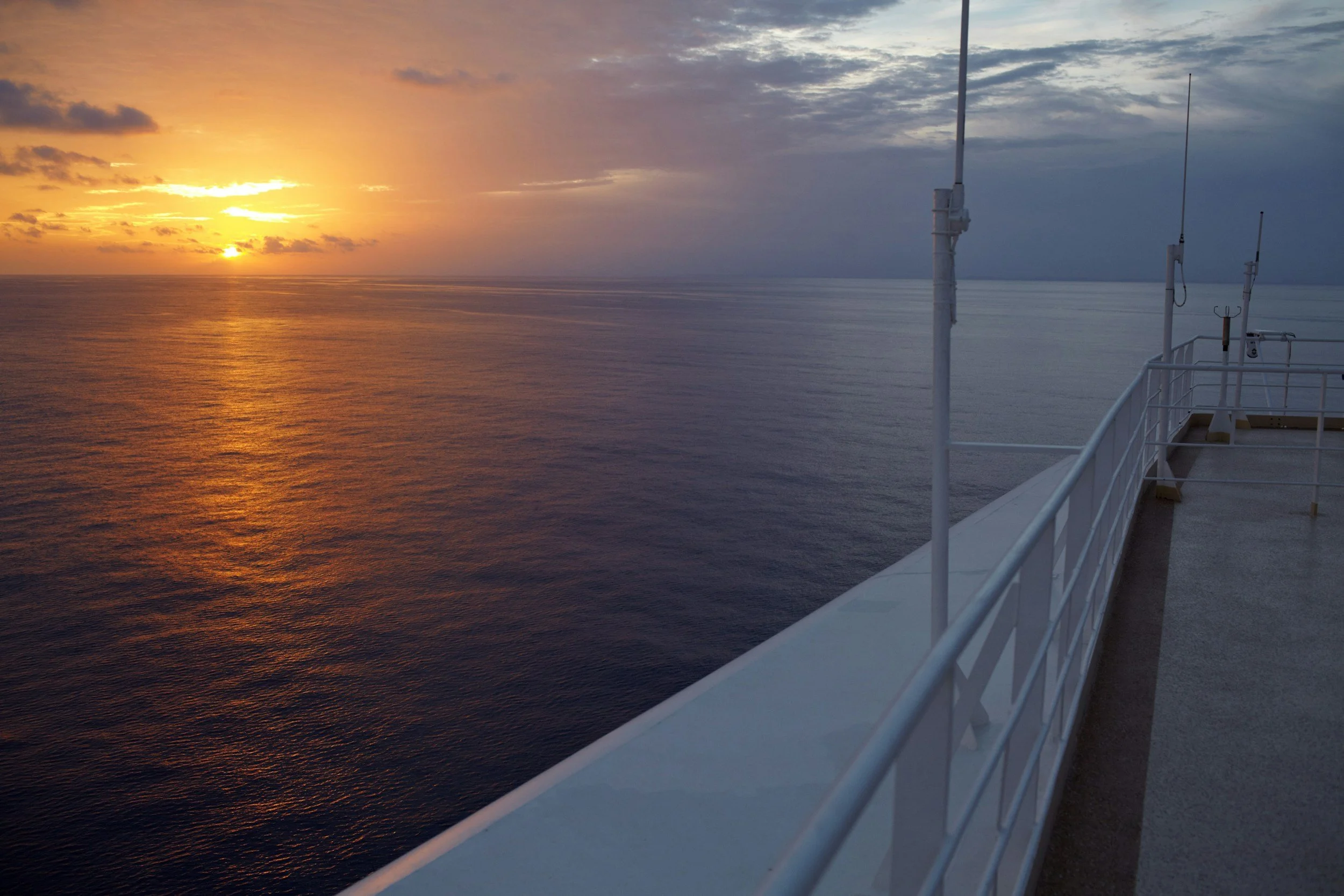Why working on a cruise ship is tougher than you think
Some people imagine cruise ship work as a kind of paid holiday – including me, once. You travel the world, live by the sea, and your biggest worry is what to eat for lunch in port. It’s an image that’s easy to believe, especially if you’ve never stepped foot in a crew corridor.
Yes, the job comes with its rewards, and its share of trade-offs. There are days when the ocean really does sparkle, and the sunset really is that good. But those moments are often fleeting – tucked between long shifts, safety drills, and a kind of tiredness that doesn’t always lift, even with sleep. Especially when insomnia becomes a regular companion.
I’ve never told anyone this, but if I did, I think they’d be surprised to hear that working on a cruise ship has been one of the toughest things I’ve done.
There are all kinds of challenges crew face. But these are the parts of ship life that wore me down the most…
Why cruise ship life can be tougher than most people expect
The ship runs 24/7 – and so do you
Unlike land-based jobs, cruise ships never sleep. The ship is a floating hotel, an engine room, a restaurant, a theatre, and a safety operation – all at once. That means someone, somewhere onboard, is always working, and for most crew, that “someone” is you.
Schedules are rarely fixed. You might work a morning shift followed by a late-night duty, or cover someone else’s hours during your only short break. Meal times are wedged in wherever they fit, and rest becomes something you’re always trying to catch up on – even if, technically, we follow the rest hour regulations.
It’s a rhythm that can be hard to adjust to, especially during your first contract. Even experienced crew members sometimes feel like they’re constantly behind, playing catch-up with sleep, energy, or simply time to breathe.
Even when you’re technically off-duty, you're rarely off the radar. You live and eat in the same place you work, surrounded by guests, supervisors, or colleagues. There’s pressure to stay presentable, polite, and composed – even when you’re tired, annoyed, or just need to be alone. Privacy is a luxury, and switching off completely is almost impossible.
Personal space is a luxury, not a given
Crew cabins are small. If you're lucky, you have a roommate who’s quiet and clean. If you’re not, you learn a lot about noise tolerance, personal boundaries, and how to live in two square metres of shared space.
Cabin time is sacred, not because it's comfortable, but because it’s the only time you’re not in public. Even then, you’re rarely alone. Curtains around your bed serve as your only “door,” and headphones become an emotional necessity.
The lack of privacy isn’t just about space. It’s about never quite having a moment that feels fully yours. And over time, that can wear you down in ways you don’t notice.
Staying connected often means staying frustrated
Internet access onboard is improving, but it’s still limited, expensive, and unreliable. Messaging apps lag. Video calls freeze. You learn to type fast when you find a strong connection, and to live with delays when you don’t.
This affects more than just your ability to scroll or stream. It changes how you stay in touch with family, handle personal admin, or unwind after work. A call home might be cut off mid-sentence. An email might take hours to send.
Being disconnected becomes a normal part of life, but that doesn’t mean it gets easier. Sometimes, staying in touch feels like a job in itself.
Shore leave isn’t as free or frequent as it sounds
Port days sound like mini-vacations, but often, they’re anything but. If your work schedule allows you to disembark, you’ll still have to wait for clearance, factor in commute time, and watch the clock to make sure you’re back before all-aboard.
Many crew skip port entirely. Not because they don’t want to explore, but because they’re too tired, short on time, or simply not allowed off. Some ports are too far from the city. Others are turnaround days, when the ship is busiest.
While passengers plan excursions and sip cocktails by the beach, crew life continues in the background – quietly, constantly, often unseen.
Safety drills and surprise duties add pressure to already long days
Ship safety is taken seriously, as it should be. Regular drills – fire, abandon ship, man overboard – are part of crew life, and everyone is expected to participate, regardless of department or shift. These drills aren’t optional, and they don’t count as part of your regular working hours.
That means even if you’re on night shift, you might still be required to show up for a drill in the afternoon. You adapt your sleep, squeeze in a nap if you can, and carry on.
Other tasks outside your usual role vary depending on your department. For me, it sometimes meant assisting with equipment upload or download – moving technical gear in or out of the ship. These weren’t everyday tasks, but when they came up, they added another layer to an already demanding schedule.
They’re part of the job, of course. But in a work environment that already runs at full tilt, even small additions can tip you from tired to completely drained.
Crew politics are real – and they can wear you down
Life onboard isn’t just about following schedules. It’s about navigating personalities. From department drama to power imbalances, crew politics are something most people experience, even if no one really talks about it.
Some team leaders play favourites. Some colleagues avoid work and leave others to pick up the slack. Cliques form, conflicts simmer, and rumours travel faster than internet signals. It’s not unique to ships, of course, but the confined space and long hours make everything feel more intense.
You learn quickly who to trust, who to avoid, and when to keep your head down. It's part of survival in the floating workplace.
Bad weather hits harder than most expect
Most of the time, sailing routes are predictable. But when typhoons or rough seas hit, you feel it – even if the ship avoids the centre of the storm.
Rough waters rock you awake at 3 am, send your belongings sliding off shelves, and turn your routine into a struggle for balance. Crew walk slower. Conversations go quiet. Even the most seasoned staff grip the railings tighter and brace through the shift.
Bad weather means more than just a bumpy ride. It adds duties, delays, and a tension that hangs in the air. You feel it in your legs, your stomach, and your sleep. And you carry on – not because it’s easy, but because there’s no other option.
How to create small rituals that ground you at sea
1. Notice what small moments give you comfort during your day
Start by paying attention to small moments that help you feel grounded. These might already be part of your day – you’re just naming them now. For example:
Listening to the same playlist while getting ready for work
Sitting with a cup of coffee at the same table in the mess
Lingering a few seconds by the door before heading out
Standing alone on a certain deck corner during break
Sneaking in a five-minute “micro break” before the next duty
2. Turn those moments into a repeatable routine
Once you've found those comforting moments, lean into them. Repeat them on purpose. You don’t need to invent new habits – just give quiet attention to the ones you already have.
3. Adjust as you go
Nothing onboard stays fixed. Maybe your coffee spot gets taken, your cabinmate changes, or your break time changes. That’s okay – you might find a new corner, a new moment, a new rhythm. The point isn’t to preserve the ritual exactly. It’s to keep finding ways to ground yourself, wherever you are.

Printable Seafarer Inspiration Calendar
A minimalist A7 calendar filled with motivational quotes for seafarers, affirmations, and contract-life reminders. Fully printable and editable for personal use at sea.
Buy NowFor more reflections on crew life, you might also like this honest look at cruise ship crew mental health or these practical tips for coping with stress while working on ships.












